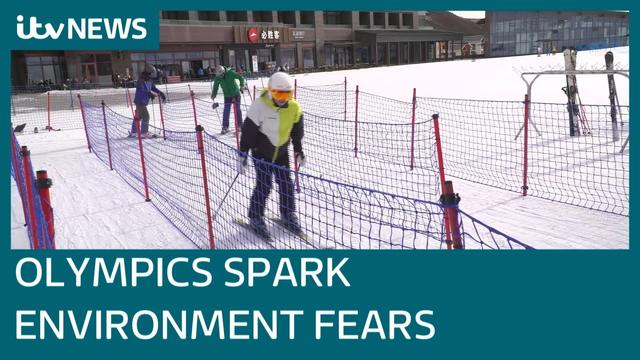ITV News Asia Editor Debi Edward reports from Beijing's Olympics slopes, which are all lined with artificial snow
When tuning in to watch the Beijing Winter Olympics only a very keen observer might be able to spot something different, although a bit of deduction might lead you to question why the surrounding hills are brown, but the slopes are white. That would be because for the first time in the history of the Games, athletes will compete on 100% artificial snow. There’s a team of 90 specialists employed to ensure the exact density and diameter. They are also responsible for producing an estimated 49 million gallons of snow for the duration of the Games.
Team GB aiming to break records at Beijing 2022Can China pull off the Winter Olympics it promised?The technology has been refined, but it is not new - fake snow was first used at the Lake Placid, New York Games of 1980. In a warming world it has gone from being used sparingly, to becoming the dominant source.
The 2014 Sochi Games used 80% man-made snow, the last event in South Korea was closer to 90%. Almost all the world's ski resorts now rely on snowmaking to some extent, either to ensure good quality conditions, prolong their season, or both. Beijing was awarded the Olympics despite its mountain areas having an average winter precipitation of just 8mm. In an arid, and already water scarce part of the country, it raises huge environmental concerns. The demand for fake snow puts immense pressure on the local water supply, drawing resources from neighbouring provinces. The white stuff is created using chemically treated water which will be churned out through 130 fan-driven snow generators and 300 snow-making guns. It is an energy intensive process that is costly as well as damaging for the surrounding areas. Even if it is powered by renewables, it’s still going to be a big draw on energy supplies. The Games organising authorities insist they have met environmental standards and not been detrimental to the local area.
The increased use of artificial snow has also added to the unpredictability and danger of winter sports. Fake snow tends to be more compact, and together with global fluctuations in temperatures and weather, it can make for inconsistent icy conditions.

For a Loughborough University study into the impact of artificial snow on the athletes, British skier Laura Donaldson said: “In a poor snow season (of which there are many more) the snow is of noticeably poorer quality underfoot. These conditions can represent a greater danger for athletes, since poor snow quality determines how the athlete skis. It is less stable under the skis and it may not fully cover rocks and plants.”
Meanwhile, Winter Olympian Peter Speight raised concerns about the impact on the environment.
“It's helpful for creating physical snow for people to use, but it uses large amounts of water and energy and does not help solve climate change," the British skier said.
"We need to solve climate change at the source (reduce greenhouse gas emissions) rather than rely on mitigation focused solutions.”
Team GB Skier Dave Ryding talks preparing for artificial snow and how Covid will impact his Olympics experience
When Britain's Dave Ryding won the World Cup slalom in Austria last weekend it was on crisp, fresh Alpine snow. He knows the runs will be very different in China but when the 35-year-old spoke to us from his home in England, where he is isolating until he flies to Beijing, he said he and his team have to be prepared for everything.
“I know my equipment works this season, it’s working on everything, man-made snow, polluted snow, whatever it is, we’ll find something,” Ryding explained.
China hopes to create a one trillion-dollar industry off the back of hosting the Winter Games. In the years leading up to 2022 it has invested heavily in new facilities and encouraging millions to take up winter sports. The artificial snow generated for these Games is just a fraction of what is going to be needed to sustain China's fledgling ski industry for decades to come, across hundreds of resorts.
If you watch Fight Club in China you will get an entirely different ending









